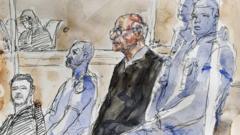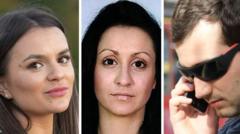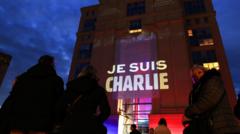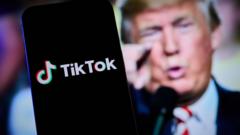A Paris court is set to deliver its verdict on eight defendants accused of complicity in the murder of high school teacher Samuel Paty, whose tragic death became a focal point in discussions around free speech and radicalism. The case, which has drawn attention to the consequences of misinformation and online campaigns, raises important legal questions about the boundaries of accountability in politically charged environments.
Verdict Looms for Eight Accused in Samuel Paty's Murder Case
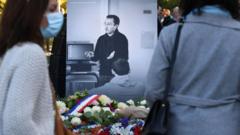
Verdict Looms for Eight Accused in Samuel Paty's Murder Case
After a six-week trial, eight individuals await judgement for their alleged roles in the murder of French teacher Samuel Paty, sparking debates on free speech and responsibility.
Eight individuals accused of involvement in the jihadist murder of French teacher Samuel Paty are about to learn their fate following a rigorous six-week trial in a Paris court. Among those on trial is the father of a schoolgirl whose misleading claims about Paty's treatment of Muslim students set off a dangerous chain reaction culminating in his brutal beheading in October 2020.
The defendants also include an activist who spearheaded an online smear campaign against Paty, two childhood friends of the Chechen-born assailant Abdoullakh Anzorov who allegedly assisted him in obtaining weapons, and four radicalised men who exchanged digital messages with him. Anzorov himself was shot by police mere moments after he murdered the 47-year-old history-geography teacher outside his secondary school in Conflans-Saint-Honorine.
The events began after Paty conducted a lesson on freedom of speech, during which he showed images of the Prophet Muhammad—controversial depictions originally published by Charlie Hebdo. He had warned students that they could choose not to look. The schoolgirl, identified as Z. Chnina, mistakenly told her father she had been punished for her objections, prompting him to publicly denounce Paty through social media and draw further attention to the teacher.
The trial has ignited intense legal debates regarding whether individuals who lacked direct knowledge of the murder could still be held liable for "terrorist association" due to their earlier actions. Prosecutors have called for prison sentences ranging from 18 months to 16 years, stressing that the accused indirectly contributed to Paty's death. However, their decision not to pursue maximum sentences has caused frustration among Paty's family.
This week, Z. Chnina offered public testimony, sobbing as she expressed remorse for her part in the situation. "I want to apologise to all the family of Paty because were it not for my lies, they would not be here today," she stated. Her father, Brahim Chnina, had mobilized an online campaign largely based on her inaccuracies, involving activist Abdelhakim Sefrioui to amplify their messages.
While Sefrioui and Brahim Chnina never overtly called for violence against Paty, prosecutors argue they contributed to an environment where such an act could occur. The legal discussions surrounding their knowledge and intent have led to a complex case where free speech intertwines with accountability in the face of violent extremism.
The court has also focused on the two friends of Anzorov who accompanied him to purchase a knife and a fake gun, as well as a convert to Islam, Priscilla Mangel, who acknowledged making provocative comments online—asserting she was unaware of Anzorov's violent intentions.
Defense attorneys maintain that their clients would not have faced charges if Paty had not been murdered, raising crucial questions about the legality of speech based on subsequent events. The trial reflects the broader societal struggle with navigating free expression amid heightened fears of radical violence, amplified by previous attacks on figures like those at Charlie Hebdo.

